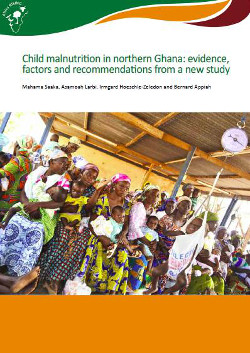Child malnutrition in northern Ghana: evidence, factors, and recommendations from a new study
 According to this survey report, child malnutrition remains a challenge in northern Ghana. The report which was part of a baseline conducted by Africa RISING in five districts in Northern, Upper East, and Upper West regions of Ghana also indicates that wasting in some of the districts was above the normal 15.0% level recommended by the World Health Organization (WHO) and can be described as being very high or critical.
According to this survey report, child malnutrition remains a challenge in northern Ghana. The report which was part of a baseline conducted by Africa RISING in five districts in Northern, Upper East, and Upper West regions of Ghana also indicates that wasting in some of the districts was above the normal 15.0% level recommended by the World Health Organization (WHO) and can be described as being very high or critical.
Other revelations from the survey are that children did not eat protein-rich food often enough for good health as most (90.8%) were fed on cereal-based foods. Also the intake of foods known to have a good content of micronutrients and protein was less than satisfactory. For example, only 14.3% of children were fed on vitamin A-rich fruits and vegetables.
Over the past three years, Africa RISING has been implementing various activities in northern Ghana and Mali to improve the household nutritional status of smallholder families. Ongoing research activities have focused on increasing crop and livestock productivity and household dietary diversity through cereal–legume- vegetable intercropping regimes.
The findings of this survey, among many others, confirm the need for agricultural research-for-development initiatives to address nutrition challenges faced by communities when designing and implementing programs and projects. This is because despite remarkable advances in agricultural research, progress in improving the nutrition and health of smallholder farm families in developing countries still lags. This is also in spite of a consensus that agricultural investments targeted to smallholder farmers are more
likely to succeed if they address the human capital constraints due to malnutrition.
Read and download the report here: https://cgspace.cgiar.org/handle/10568/67037
